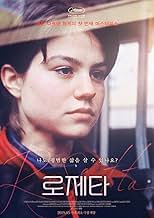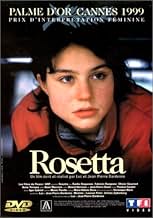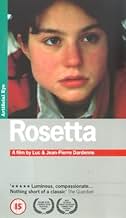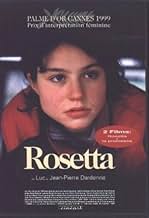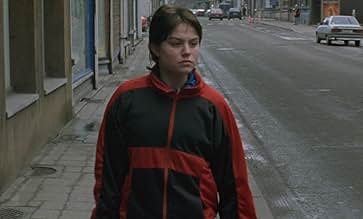Rosetta
- 1999
- Tous publics
- 1h 35min
NOTE IMDb
7,4/10
17 k
MA NOTE
La jeune et impulsive Rosetta vit avec sa mère alcoolique. Mue par le désespoir, elle est prête à tout pour conserver un emploi.La jeune et impulsive Rosetta vit avec sa mère alcoolique. Mue par le désespoir, elle est prête à tout pour conserver un emploi.La jeune et impulsive Rosetta vit avec sa mère alcoolique. Mue par le désespoir, elle est prête à tout pour conserver un emploi.
- Réalisation
- Scénario
- Casting principal
- Récompenses
- 10 victoires et 7 nominations au total
Leon Michaux
- First Policeman
- (as Léon Michaux)
Avis à la une
The Dardenne brothers were not incorrect when they called their Palme D'Or winning work "a war film.". It is an unremitting portrayal of the most dire hardships, centred around Rosetta (Emilie Dequenne), a young, spirited girl who battles with desperate tenacity to find a job and not so much escape as merely survive in her surroundings. Her life is a bleak struggle for subsistence in a world devoid of tenderness, in which her mother (Anne Yernaux), a quasi-prostitute more concerned with the source of her next drink than her daughter, stands as an example of the potential results of such continued deprivation. When she is befriended by a waffle vendor (Fabrizio Rongione), her prior existence leaves her unsure of how to act in the presence of an affectionate, concerned face, and when he attempts to teach her to dance, she can do no more than move jerkily without rhythm, uncomfortable in the arms of another human. The arisal of an opportunity to take his job forces Rosetta to confront whether physical necessity can ever be an excuse for the betrayal of others.
What follows is a superbly wrought piece of social realism, unsentimental in its examination of the dehumanising effects of poverty. For Rosetta and many others in analogous situations of the most dire physical hardship, their material deprivation leads to an erosion emotional and mental qualities. The Dardenne brothers' ruthless directional style, laced with close-ups and unpleasant details, tangibly conveys the dirt and drudgery of Rosetta's impoverished life. Indeed, the film is palpably cold, almost painfully explicit in its depiction of an uncaring world. In addition, Dardenne's performance, for which she won the Best Actress Award at Cannes, brings to life with understated excellence her fight, not to live well, but simply to survive by any means in a world that, for her, contains few hopes and no love.
The Dardenne brothers make no excuses or apologies for their presentation of Rosetta's base strivings, delivering a film that charts how far individuals can fall. Consistently raw and at times brutal, the film nevertheless proposes no answers, expects no sympathy, it merely conveys and evokes with a clear, uncompromising eye the bleak struggle for existence that is, for some, the total of what life has to offer. Harsh, but utterly compelling viewing.
What follows is a superbly wrought piece of social realism, unsentimental in its examination of the dehumanising effects of poverty. For Rosetta and many others in analogous situations of the most dire physical hardship, their material deprivation leads to an erosion emotional and mental qualities. The Dardenne brothers' ruthless directional style, laced with close-ups and unpleasant details, tangibly conveys the dirt and drudgery of Rosetta's impoverished life. Indeed, the film is palpably cold, almost painfully explicit in its depiction of an uncaring world. In addition, Dardenne's performance, for which she won the Best Actress Award at Cannes, brings to life with understated excellence her fight, not to live well, but simply to survive by any means in a world that, for her, contains few hopes and no love.
The Dardenne brothers make no excuses or apologies for their presentation of Rosetta's base strivings, delivering a film that charts how far individuals can fall. Consistently raw and at times brutal, the film nevertheless proposes no answers, expects no sympathy, it merely conveys and evokes with a clear, uncompromising eye the bleak struggle for existence that is, for some, the total of what life has to offer. Harsh, but utterly compelling viewing.
This is beyond the intensity of Gary Oldman's "Nil By Mouth", and Tim Roth's "The War Zone", while Erick Zonca's "Dreamlife of Angels" seems heavenly compared to the conditions presented in "Rosetta" by Luc and Jean-Pierre Dardenne.
A down right harsh film. Unsparingly direct depiction of a young girl's poverty struggle. She is as tough as she can be. She fights vigorously to hang on to a job. She cares for her mother, a helpless alcoholic, and a seamstress when not drunk. Rosetta (Emilie Dequenne) is unrelentingly stubborn about receiving kindness, or food unsolicited. She has her dignity. A young person with so much burden on her shoulder and a heavy heart.
Things may be seemingly repetitive: again and again we see her crossing that traffic roadway, jumping into the bush trail; we hear the rustling leaves, the thumping of her footsteps; we watch her stopping by the hideout where she kept her rubber boots, changing her only good pair of working shoes; we follow her as she crawls through the wire fence loophole, arriving at the campers -- feels like a mindless routine. Yet, she's intensely single-minded on getting "a real job" (vs. moonlighting) and to have "a normal life", not to "fell into a rut". At one point, we can almost be happy for her to have "found a friend" in Riquet (Fabrizio Rongione), a waffle street van vendor. She actually was able to peacefully sleep that night. Only to wake up and report at work to be told she's again out of a job. A devastating blow. Out of desperation, she did something that most of us viewers may not be able to comprehend -- but what do we know of her travails, who are we to judge her action?
It was not easy for her to have done what she did -- she did hesitate and took the risk. She risked her newfound friendship -- she desperately needed "to have a job". In a way, she has lack tenderness, love and warmth for so long that she's numb to human kindness -- she needs to be thawed! One has to be patient with her, to give her time and see through her tough surface and rekindle her heart. Trust needs to be rebuilt for her to continue living and tackle difficulties afresh!
This is no Hollywood fare. Dialogs are few. No exploitative, explosive, abusive scenes. We're given the bare structure of the story, and Rosetta, plus the sparing few supporting characters, held the movie steadily intact.
A down right harsh film. Unsparingly direct depiction of a young girl's poverty struggle. She is as tough as she can be. She fights vigorously to hang on to a job. She cares for her mother, a helpless alcoholic, and a seamstress when not drunk. Rosetta (Emilie Dequenne) is unrelentingly stubborn about receiving kindness, or food unsolicited. She has her dignity. A young person with so much burden on her shoulder and a heavy heart.
Things may be seemingly repetitive: again and again we see her crossing that traffic roadway, jumping into the bush trail; we hear the rustling leaves, the thumping of her footsteps; we watch her stopping by the hideout where she kept her rubber boots, changing her only good pair of working shoes; we follow her as she crawls through the wire fence loophole, arriving at the campers -- feels like a mindless routine. Yet, she's intensely single-minded on getting "a real job" (vs. moonlighting) and to have "a normal life", not to "fell into a rut". At one point, we can almost be happy for her to have "found a friend" in Riquet (Fabrizio Rongione), a waffle street van vendor. She actually was able to peacefully sleep that night. Only to wake up and report at work to be told she's again out of a job. A devastating blow. Out of desperation, she did something that most of us viewers may not be able to comprehend -- but what do we know of her travails, who are we to judge her action?
It was not easy for her to have done what she did -- she did hesitate and took the risk. She risked her newfound friendship -- she desperately needed "to have a job". In a way, she has lack tenderness, love and warmth for so long that she's numb to human kindness -- she needs to be thawed! One has to be patient with her, to give her time and see through her tough surface and rekindle her heart. Trust needs to be rebuilt for her to continue living and tackle difficulties afresh!
This is no Hollywood fare. Dialogs are few. No exploitative, explosive, abusive scenes. We're given the bare structure of the story, and Rosetta, plus the sparing few supporting characters, held the movie steadily intact.
I saw "Rosetta" several weeks ago - and I still fail to recall any movie which could convey such an immediate sense of being pysically there, all the time along Rosetta's everydays' "war". We are bombarded and flooded with images 16hours per day, it takes great stregth of vision, of images, atmosphere and characters to grab at you this effectively in year 2000! Rosetta struck my as a very real encounter, with all the nonsense and ups / down of real events and life... It made me feel more of life, made me think of it more often and more intensely, it made me look into more eyes than I did before... Thank you, Luc and Jean-Pierre! and thank you, Emilie and all!
Have you seen the 1948 Italian classic "Bicycle Thieves"? Yeah think that, pumped up on crack. This is "Italian neorealism" but set in Belgium a half century later.
The character "Rosetta" is a 16-year-old girl who lives in a camper with her nearly catatonic, alcoholic mother and is, as the filmmakers say, "a thin aluminum wall away from living on the streets". The fact that Rosetta is barely an adolescent who is thrust into the role of provider and responsible adult is a clever twist that further turns this social statement upside down. It becomes not just a tale of survival but terrifyingly a coming-of-age flick. Rosetta is socially and emotionally stunted, unfinished and handicapped. It's fascinating to see Rosetta (excellently played by Émilie Dequenne who won Best Actress at Cannes) attempting to grasp concepts of morality and ethics even though she has clearly had no guidance. There is a certain wild animal quality to her which you will immediately feel, and though she is tough and headstrong, she is still just a teenager who doesn't know how to dance, doesn't know what a "friend" is, and whose only reality consists of obsessively trying to find a legitimate job because she feels that's the coveted symbol of having a normal life.
In that respect, this film provides something we can all apply to our lives whether we're 16-year-old homeless kids or rising corporate execs. It's the idea that an obsessive pursuit of some type of social status, or social achievement, or even a relationship, is what we cling to as proof that we have a "normal life".
In a memorable scene our protagonist Rosetta talks herself to sleep by whispering, "Your name is Rosetta. My name is Rosetta. You found a job. I found a job. You've got a friend. I've got a friend. You have a normal life. I have a normal life. You won't fall into the abyss. I won't fall into the abyss. Good night. Good night."
The camera remains very tight, almost claustrophobically so, on Rosetta throughout the entire film which exaggerates the microscopic world she lives in. She repeats routines and engages in trivial labors which are shown to us in almost tedious repetition, but the effect is powerful in conveying a sense of quiet, lonely desperation.
Throughout the history of cinema, there have been many films that document "how the other half lives" but most of them approach the subject as if we are spectators, almost in a patronizing or voyeuristic way that leaves us thinking after the credits roll "phew I'm glad that's not me" but here in "Rosetta" we get a sense that the bizarre life of this 16 year old outcast might very well be the story of the human race.
The character "Rosetta" is a 16-year-old girl who lives in a camper with her nearly catatonic, alcoholic mother and is, as the filmmakers say, "a thin aluminum wall away from living on the streets". The fact that Rosetta is barely an adolescent who is thrust into the role of provider and responsible adult is a clever twist that further turns this social statement upside down. It becomes not just a tale of survival but terrifyingly a coming-of-age flick. Rosetta is socially and emotionally stunted, unfinished and handicapped. It's fascinating to see Rosetta (excellently played by Émilie Dequenne who won Best Actress at Cannes) attempting to grasp concepts of morality and ethics even though she has clearly had no guidance. There is a certain wild animal quality to her which you will immediately feel, and though she is tough and headstrong, she is still just a teenager who doesn't know how to dance, doesn't know what a "friend" is, and whose only reality consists of obsessively trying to find a legitimate job because she feels that's the coveted symbol of having a normal life.
In that respect, this film provides something we can all apply to our lives whether we're 16-year-old homeless kids or rising corporate execs. It's the idea that an obsessive pursuit of some type of social status, or social achievement, or even a relationship, is what we cling to as proof that we have a "normal life".
In a memorable scene our protagonist Rosetta talks herself to sleep by whispering, "Your name is Rosetta. My name is Rosetta. You found a job. I found a job. You've got a friend. I've got a friend. You have a normal life. I have a normal life. You won't fall into the abyss. I won't fall into the abyss. Good night. Good night."
The camera remains very tight, almost claustrophobically so, on Rosetta throughout the entire film which exaggerates the microscopic world she lives in. She repeats routines and engages in trivial labors which are shown to us in almost tedious repetition, but the effect is powerful in conveying a sense of quiet, lonely desperation.
Throughout the history of cinema, there have been many films that document "how the other half lives" but most of them approach the subject as if we are spectators, almost in a patronizing or voyeuristic way that leaves us thinking after the credits roll "phew I'm glad that's not me" but here in "Rosetta" we get a sense that the bizarre life of this 16 year old outcast might very well be the story of the human race.
This film relies mainly on one camera to capture every little action and detail of the lead character, Rosetta, especially in her reactions to the despair she suffers throughout the film. I caught this one on IFC on May 23rd. The acting is so realistic, it is hard to imagine that the story is fictional and is shot in a documentary type style, where the hand held camera follows the actors, sneaks glimpses of their world in much the same way an ENG crew would on a story about poverty in a small European town where the economy is so bad there is little one can do to survive outside of desperate acts. In this case, Rosetta, the young girl with an alcoholic mother, lives in a trailer with no heat, has to sell re-sewn clothes to make a meager existence until she finally sees an opportunity open up for a job selling waffles at a small stand in a high traffic part of town. A young man who works there is smitten with her and offers to split some earnings from selling waffles he makes outside of his boss's knowledge. To tell you what happens next would give away the rest, but suffice to say this film is bitterly realistic, terribly sad and the ending is rather sudden but it shows some promise for the characters. The movie is shot with almost no budget, but some great camera work, some scenes a little long but edited fairly well, no music, and subtitles under the French dialog. It deserves awards for telling a very credible story demonstrating hardship of the poor in Europe and what measures one has to take to survive. I was deeply moved and driven to weep during painful scenes of the lead character's despair and what seems to be a hopeless situation. The character is genuinely portrayed by a young actress from Belgium performing extremely well for her first film role. Fine work by director and cast.
Le saviez-vous
- AnecdotesContrary to popular belief, the film did not inspire a new so-called "Rosetta Law" in Belgium that prohibited employers from paying teen workers less than the minimum wage and included other youth labour reforms. In a Guardian interview with the Dardenne brothers, Jean-Pierre explained the misconception: "No, that law already existed, it just hadn't been voted through yet. The truth is always less interesting than the fiction."
- GaffesWhen Rosetta is giving her mother money for a water bill she is wearing a jacket with the sleeves fully extended. However in the next immediate cut when she goes outside the sleeves are rolled up.
- Bandes originalesSomething New
Meilleurs choix
Connectez-vous pour évaluer et suivre la liste de favoris afin de recevoir des recommandations personnalisées
- How long is Rosetta?Alimenté par Alexa
Détails
- Date de sortie
- Pays d’origine
- Site officiel
- Langue
- Aussi connu sous le nom de
- Розетта
- Lieux de tournage
- Sociétés de production
- Voir plus de crédits d'entreprise sur IMDbPro
Box-office
- Montant brut aux États-Unis et au Canada
- 266 665 $US
- Week-end de sortie aux États-Unis et au Canada
- 20 187 $US
- 7 nov. 1999
- Montant brut mondial
- 293 092 $US
Contribuer à cette page
Suggérer une modification ou ajouter du contenu manquant


![Regarder Bande-annonce [OV]](https://m.media-amazon.com/images/M/MV5BOWY4MGMzYTItZjQwOS00MmVhLWE0MDYtMGZmYmFjNTkyYTU2XkEyXkFqcGdeQXRyYW5zY29kZS13b3JrZmxvdw@@._V1_QL75_UX500_CR0)


